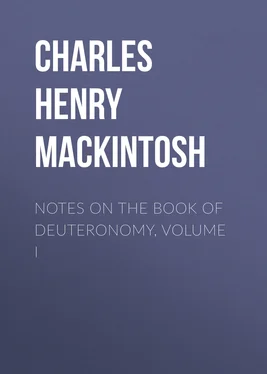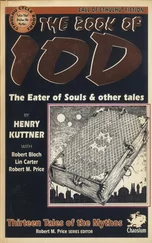Charles Henry Mackintosh - Notes on the Book of Deuteronomy, Volume I
Здесь есть возможность читать онлайн «Charles Henry Mackintosh - Notes on the Book of Deuteronomy, Volume I» — ознакомительный отрывок электронной книги совершенно бесплатно, а после прочтения отрывка купить полную версию. В некоторых случаях можно слушать аудио, скачать через торрент в формате fb2 и присутствует краткое содержание. Жанр: foreign_prose, foreign_antique, на английском языке. Описание произведения, (предисловие) а так же отзывы посетителей доступны на портале библиотеки ЛибКат.
- Название:Notes on the Book of Deuteronomy, Volume I
- Автор:
- Жанр:
- Год:неизвестен
- ISBN:нет данных
- Рейтинг книги:4 / 5. Голосов: 1
-
Избранное:Добавить в избранное
- Отзывы:
-
Ваша оценка:
- 80
- 1
- 2
- 3
- 4
- 5
Notes on the Book of Deuteronomy, Volume I: краткое содержание, описание и аннотация
Предлагаем к чтению аннотацию, описание, краткое содержание или предисловие (зависит от того, что написал сам автор книги «Notes on the Book of Deuteronomy, Volume I»). Если вы не нашли необходимую информацию о книге — напишите в комментариях, мы постараемся отыскать её.
Notes on the Book of Deuteronomy, Volume I — читать онлайн ознакомительный отрывок
Ниже представлен текст книги, разбитый по страницам. Система сохранения места последней прочитанной страницы, позволяет с удобством читать онлайн бесплатно книгу «Notes on the Book of Deuteronomy, Volume I», без необходимости каждый раз заново искать на чём Вы остановились. Поставьте закладку, и сможете в любой момент перейти на страницу, на которой закончили чтение.
Интервал:
Закладка:
Thus it must ever be. The path of self-will is sure to be a path of darkness and misery; it cannot be otherwise: the path of obedience, on the contrary, is a path of peace, a path of light, a path of blessing, a path on which the beams of divine favor are ever poured in living lustre. It may, to the human eye, seem narrow, rough, and lonely; but the obedient soul finds it to be the path of life, peace, and moral security. "The path of the just is as the shining light, that shineth more and more unto the perfect day." Blessed path! May the writer and the reader ever be found treading it, with a steady step and earnest purpose.
Before turning from this great practical subject of divine guidance and human obedience, we must ask the reader to refer, for a few moments, to a very beautiful passage in the eleventh chapter of Luke. He will find it full of the most valuable instruction.
"The light of the body is the eye: therefore when thine eye is single, thy whole body also is full of light; but when thine eye is evil, thy body also is full of darkness. Take heed, therefore, that the light which is in thee be not darkness. If thy whole body therefore be full of light, having no part dark, the whole shall be full of light, as when the bright shining of a candle doth give thee light." (Ver. 34-36.)
Nothing can exceed the moral force and beauty of this passage. First of all, we have the "single eye." This is essential to the enjoyment of divine guidance. It indicates a broken will—a heart honestly fixed upon doing the will of God. There is no under-current, no mixed motive, no personal end in view. There is the one simple desire and earnest purpose to do the will of God, whatever that will may be.
Now, when the soul is in this attitude, divine light comes streaming in and fills the whole body. Hence it follows that if the body is not full of light, the eye is not single; there is some mixed motive; self-will or self-interest is at work; we are not upright before God. In this case, any light which we profess to have is darkness; and there is no darkness so gross or so terrible as that judicial darkness which settles down upon the heart governed by self-will while professing to have light from God. This will be seen in all its horrors by and by in christendom, when "that Wicked shall be revealed, whom the Lord shall consume with the spirit of His mouth, and shall destroy with the brightness of His coming; even him, whose coming is after the working of Satan with all power and signs and lying wonders, and with all deceivableness of unrighteousness in them that perish; because they received not the love of the truth , that they might be saved. And for this cause God shall send them strong delusion, that they should believe a lie; that they all might be damned who believed not the truth, but had pleasure in unrighteousness ." (2 Thess. ii. 8-12.)
How awful is this! How solemnly it speaks to the whole professing church! How solemnly it addresses the conscience of both the writer and the reader of these lines! Light not acted upon becomes darkness.—"If the light which is in thee be darkness, how great is that darkness!" But on the other hand, a little light honestly acted upon is sure to increase; for "to him that hath shall more be given," and "the path of the just is as the shining light, that shineth more and more unto the perfect day."
This moral progress is beautifully and forcibly set forth in Luke xi. 36.—"If thy whole body therefore be full of light, having no part dark "—no chamber kept closed against the heavenly rays—no dishonest reserve—the whole moral being laid open, in genuine simplicity, to the action of divine light; then "the whole shall be full of light, as when the bright shining of a candle doth give thee light." In a word, the obedient soul has not only light for his own path, but the light shines out, so that others see it, like the bright shining of a candle. "Let your light so shine before men, that they may see your good works, and glorify your Father which is in heaven."
We have a very vivid contrast to all this in the thirteenth chapter of Jeremiah.—"Give glory to the Lord your God, before He cause darkness , and before your feet stumble upon the dark mountains, and while ye look for light, He turn it into the shadow of death, and make it gross darkness." The way to give glory to the Lord our God is to obey His Word. The path of duty is a bright and blessed path; and the one who, through grace, treads that path will never stumble on the dark mountains. The truly humble, the lowly, the self-distrusting, will keep far away from those dark mountains, and walk in that blessed path which is ever illuminated by the bright and cheering beams of God's approving countenance.
This is the path of the just, the path of heavenly wisdom, the path of perfect peace. May we ever be found treading it, beloved reader; and let us never, for one moment, forget that it is our high privilege to be divinely guided in the most minute details of our daily life. Alas! for the one who is not so guided. He will have many a stumble, many a fall, many a sorrowful experience. If we are not guided by our Father's eye, we shall be like the horse or the mule, which have no understanding, whose mouth must be held in with bit and bridle,—like the horse, impetuously rushing where he ought not, or the mule, obstinately refusing to go where he ought. How sad for a Christian to be like these! How blessed to move, from day to day, in the path marked out for us by our Father's eye!—a path which the vulture's eye hath not seen, or the lion's whelp trodden; the path of holy obedience; the path in which the meek and lowly will ever be found, to their deep joy, and the praise and glory of Him who has opened it for them and given them grace to tread it.
In the remainder of our chapter, Moses rehearses in the ears of the people, in language of touching simplicity, the facts connected with the appointment of the judges, and the mission of the spies. The appointment of the judges, Moses here attributes to his own suggestion: the mission of the spies was the suggestion of the people. That dear and most honored servant of God felt the burden of the congregation too heavy for him; and assuredly it was very heavy; though we know well that the grace of God was amply sufficient for the demand, and, moreover, that that grace could act as well by one man as by seventy.
Still, we can well understand the difficulty felt by "the meekest man in all the earth" in reference to the responsibility of so grave and important a charge; and truly the language in which he states his difficulty is affecting in the highest degree. We feel as though we must quote it for the reader.
"And I spake unto you at that time, saying, 'I am not able to bear you myself alone [Surely not; what mere mortal could? But God was there to be counted upon for exigence of every hour.]: the Lord your God hath multiplied you, and, behold, ye are this day as the stars of heaven for multitude.' (The Lord God of your fathers make you a thousand times so many more as ye are, and bless you, as He hath promised you.)" Lovely parenthesis! Exquisite breathing of a large and lowly heart! "How can I myself alone bear your cumbrance, and your burden, and your strife ?"
Alas! here lay the secret of much of the "cumbrance" and the "burden." They could not agree among themselves,—there were controversies, contentions, and questions; and who was sufficient for these things? what human shoulder could sustain such a burden? How different it might have been with them! Had they walked lovingly together, there would have been no cases to decide, and therefore no need of judges to decide them. If each member of the congregation had sought the prosperity, the interest, and the happiness of his brethren, there would have been no "strife," no "cumbrance," no "burden." If each had done all that in him lay to promote the common good, how lovely would have been the result!
Читать дальшеИнтервал:
Закладка:
Похожие книги на «Notes on the Book of Deuteronomy, Volume I»
Представляем Вашему вниманию похожие книги на «Notes on the Book of Deuteronomy, Volume I» списком для выбора. Мы отобрали схожую по названию и смыслу литературу в надежде предоставить читателям больше вариантов отыскать новые, интересные, ещё непрочитанные произведения.
Обсуждение, отзывы о книге «Notes on the Book of Deuteronomy, Volume I» и просто собственные мнения читателей. Оставьте ваши комментарии, напишите, что Вы думаете о произведении, его смысле или главных героях. Укажите что конкретно понравилось, а что нет, и почему Вы так считаете.












